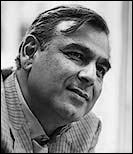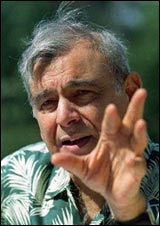
|
'It is still a struggle. I don't think it will change in the next 40 years'
Rich stories and striking pictures pepper Ismail Merchant's latest book, My Passage From India
|
Arthur J Pais
Ismail Merchant remembers owing money to Shashi Kapoor for working in his 1963 movie, The Householder. He meant to pay Shashi, but the small profits he made from the film had been invested in another film.
Now, it was 1969. Shashi was to act in another Merchant film, Bombay Talkie. And he would not face the camera without seeing his payment.
But Jennifer Kendall, Shashi's actress wife who was also acting in the movie, trusted Merchant. She lent Merchant the money to pay Shashi. "So, in effect, I used Shashi's own money to settle my debt with him," Merchant writes in his newest book, My Passage From India (Viking Studio, 150 pages, $35).
"Of course, I returned the money to Jennifer as soon as I was able, but the whole transaction remained a secret from Shashi," he adds.
A slim book with rich stories and striking pictures --- including rare ones like the one showing Merchant with his father and [founder of Pakistan] Mohammad Ali Jinnah; Merchant with his screen flame Nimmi and visiting French actress Jean Moreau --- it is filled with many familiar stories, especially for those who have known Merchant over the years or have read newspaper and magazine stories on him, and many new ones.
The book is also a primer on raising money and bringing to the screen projects like The Golden Bowl, based on a Henry James novel that the more established and financially secure producers would hesitate to touch.
Though the book could have been edited better --- even a first-year copy editor could have trimmed the many bloated sentences --- it is fascinating reading.
Ismail Merchant is an engaging and passionate storyteller, and it is impossible not to wish he had filled us in on many more stories.
One of the most noted independent filmmakers in the world, Merchant has been producing films for over four decades. Most of them have been written by the Booker Prize winner Ruth Prawer Jhabvala and directed by James Ivory. Merchant has directed four films.
Though some critics slammed their movies like The Bostonians and Howards End for being more picturesque than great cinema, a substantial number of their films have been well regarded. Often based on literary classics or works by such as geniuses as V S Naipaul (The Mystic Masseur), their films have won significant awards, including the Oscars, and have played at major film festivals.
 They have either launched or fortified the careers of many artistes, including Pierce Brosnan (the current James Bond and star of Die Another Day), who starred in Merchant's The Deceivers in 1988; Helena Bonham Carter; Shashi Kapoor and Vanessa Redgrave.
They have either launched or fortified the careers of many artistes, including Pierce Brosnan (the current James Bond and star of Die Another Day), who starred in Merchant's The Deceivers in 1988; Helena Bonham Carter; Shashi Kapoor and Vanessa Redgrave.
But every film project produced its share of tension, fights, misunderstandings and heartburn.
There were rumours that Madhur Jaffrey, a friend of Merchant for over 40 years and who has starred in his memorable films, including Heat And Dust, was not very happy with her experience in Cotton Mary. She was the star of the film and also credited as its co-director. Merchant, of course, was the director of the film released about two years ago.
Jaffrey wasn't really willing to discuss the issue with this writer last year. But she said working for Merchant reminded her of how subjects reacted towards the rulers. "You bow your head a bit and let the ruler pass," she said with a wry smile, "and then you raise your head a bit."
Merchant was reluctant to speak about the fight between them. He was saving the story for his book. Merchant writes that the actress who had brought the project to him also wanted to direct the film.
But the financiers as well as Universal Pictures, which would distribute the film in USA and several other countries, thought letting Jaffrey direct would be too much of a burden, especially since she was in practically every scene.
Jaffrey threatened to walk off. But her daughter Sakina, who was also in the movie, persuaded her to stay on.
There are dozens of similarly revealing stories throughout the book. However, a reader who has followed Merchant-Ivory movies in the past decade and has noticed that the films were generally unsuccessful at the box-office and weren't darlings of the critics may feel shortchanged.
Merchant, who has so eloquently discussed in detail the wavering fortunes of his company in the previous decades, does not focus much on his recent disappointments.
 In the late 1980s and early 1990s, following the worldwide success of A Room With A View (1986) and Howards End (1992), it suddenly became easy for Merchant to raise money. When Disney phoned Merchant and offered to produce his next several films, Merchant gushed, "People are throwing money at us. Unbelievable."
In the late 1980s and early 1990s, following the worldwide success of A Room With A View (1986) and Howards End (1992), it suddenly became easy for Merchant to raise money. When Disney phoned Merchant and offered to produce his next several films, Merchant gushed, "People are throwing money at us. Unbelievable."
But Jefferson In Paris (1995) and Surviving Picasso (1996) were box-office duds. They were not critical triumphs either.
Once again, Merchant was back to the basics. He would go unannounced to a financier who had not returned his phone calls and wait outside his office. Like he used to do in the 1970s and early 1980s. The financier would ignore him, hoping he would go away.
"But I would sit there like an elephant," Merchant says, recalling the story he has told this writer many times. After an hour or two, the financier who had been watching him through a glass partition, would let him in.
"He would be afraid that I would crash through," Merchant adds. "Once I had my toe in, he would find it nearly impossible to say 'no'."
Is it still like that even now, this writer asked him a few years ago, knowing well that his nephew Nayeem Hafizka is now helping him deal with difficult financiers. (Merchant says he is proud to see Hafizka execute the lessons he has learned from his uncle.) "Yes," Merchant, 66, says with a chuckle. "It is still the same struggle. And I don't think it will change for the next 40 years."
Forty years? He waits for a minute and smiles, "We have projects that would keep us busy for at least the next decade, if not the next four."